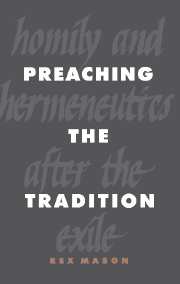Book contents
- Frontmatter
- Contents
- List of abbreviations
- Introduction
- Part I The ‘addresses’ in the Books of Chronicles
- Part II A comparison of the themes and characteristics of the addresses in the Books of Chronicles with some other post-exilic biblical material
- 8 Conclusion
- Notes
- Select bibliography
- Index of modern authors
- Subject index
- Index of biblical references
- Frontmatter
- Contents
- List of abbreviations
- Introduction
- Part I The ‘addresses’ in the Books of Chronicles
- Part II A comparison of the themes and characteristics of the addresses in the Books of Chronicles with some other post-exilic biblical material
- 8 Conclusion
- Notes
- Select bibliography
- Index of modern authors
- Subject index
- Index of biblical references
Summary
The starting point of this study was von Rad's theory that the addresses in the Books of Chronicles represented a recognisable literary genre which he called the ‘Levitical Sermon’. The study has suggested that this term cannot stand. It is difficult, if not impossible, to find satisfactory, objective criteria by which to determine a literary type ‘sermon’ so as to distinguish it clearly from prophetic oracles in general. Further, the connection with the Levites, in particular, is so tenuous as to make the term inappropriate. Nevertheless, we did observe that the addresses are marked by many of the characteristics of preaching. They often quote, or refer to, a text of ‘Scripture’ which is presumably regarded as authoritative by speakers and hearers alike. They expound some theological truth about God and they call for immediate and lively response to this truth, either by way of encouragement, rebuke or exhortation. We find characteristic rhetorical devices in them such as play on words, the use of illustration, often by way of appeal to past history, the rhetorical question and the formal call for attention on the part of the hearers. This led us to suggest that, in the addresses which the Chronicler gives to some of his principal characters, generally described by him as ‘messengers’, we might see reflected some of the homiletical practice with which he and his hearers were familiar from the second temple.
- Type
- Chapter
- Information
- Preaching the TraditionHomily and Hermeneutics after the Exile, pp. 257 - 262Publisher: Cambridge University PressPrint publication year: 1990



